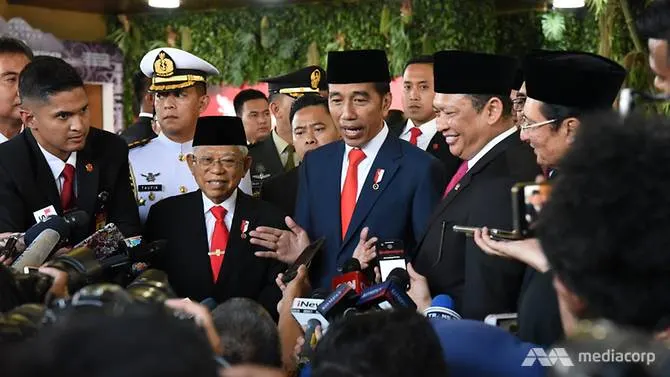Indonesia's Widodo faces test on reform credentials in second term
21 October, 2019

Indonesian President Joko Widodo was sworn in on Sunday (Oct 20) for a second five-year term as president, leading the world's third-biggest democracy after a first term marked by heavy infrastructure spending.
Widodo, 58, has pledged to cut red tape and keep building infrastructure to underpin growth in southeast Asia's largest economy, but made improving education a top priority to encourage investment and create jobs for a youthful population of 260 million people.
"This will be a big problem if we fail to create enough job opportunities," Widodo told parliament after his inauguration, where he cited his dream of Indonesia becoming one of the world's top five economies by 2045 with a GDP worth US$7 trillion.
The president said he would push two Bills to replace laws that have hampered job creation, as well as warning he could sack underperforming civil servants.
He earlier told reporters he would name his cabinet on Monday morning.
There was tight security at parliament for his swearing in alongside his vice president, Islamic cleric Ma'ruf Amin.
More than 30,000 security personnel were deployed in Jakarta following recent student demonstrations and after the country's security minister was stabbed by a suspected militant earlier this month.???????
The inauguration was attended by regional leaders including Singapore's Prime Minister Lee Hsien Loong, Australian Prime Minister Scott Morrison and Malaysia's Prime Minister Mahathir Mohamad.
Prime Minister Lee Hsien Loong attended Indonesian President Joko Widodo's inauguration ceremony on Oct 20, 2019. (Photo: Try Sutrisno Foo)
Widodo grew up in a riverside slum and was the first national leader to come from outside the political and military elite.
Widodo, known as Jokowi - a popular, heavy-metal-music loving former businessman from outside the political and military elite - was hailed as Indonesia's answer to Barack Obama when he was first elected in 2014 to lead the world's third-biggest democracy.
But Jokowi's leadership is under mounting criticism after he faced a string of challenges, from nationwide anti-government demonstrations and smog-belching forest fires that sparked diplomatic tensions with Indonesia's neighbours, to deadly unrest in Papua and an economic slowdown.
Recent protests across the archipelago of 260 million were among the biggest student rallies since mass demonstrations toppled the Suharto dictatorship in 1998.
Indonesia President Joko Widodo poses for a photograph during an interview with CNA on Aug 6, 2019. (Photo: Timothy De Souza)
The headwinds threaten to cast a shadow over Jokowi's second and final term, a stark reversal of fortune just months after he scored a thumping re-election victory against a former military general.
Sunday's inauguration also comes a little over a week after his chief security minister was stabbed in an attack by two members of a local extremist group allied to the Islamic State group, who were arrested at the scene.
Dozens of suspected militants have since been detained in a nationwide dragnet following the assassination attempt on Wiranto, a former general who goes by one name. The 72-year-old is recovering in hospital.
Authorities have banned mass demonstrations for fear the inauguration might be used as cover for another attack as militancy continues to plague the world's biggest Muslim majority nation.
Jokowi's new term also comes against the backdrop of fears that Indonesia's two-decades of democratic reforms are being eroded.
His adminstration appeared caught off guard when thousands of students hit the streets in protests last month against a raft of divisive reforms, including banning pre-marital sex and weakening the anti-graft agency. Three students died in the unrest.
Still, so far Widodo's popularity appears to be holding up, and a survey published last week by Indonesia's biggest newspaper Kompas showed his approval rating dipping only slightly to 58.8 per cent.
In April's election, Widodo defeated former general Prabowo Subianto by a double-digit margin, but the poll revealed a split with more moderate Muslims and minorities backing Widodo and conservative Muslim regions backing his rival.
Violent rioting broke out in Jakarta when Prabowo contested the poll results over claims of cheating, but the Constitutional Court upheld Widodo's victory and there have since been talks to bring some opposition figures into the government.
The make-up of Widodo's cabinet is being closely watched to see the proportion of technocrats versus party affiliated posts and there has been speculation that Prabowo or other members of the opposition could join the cabinet.
Ahead of the start of his new term, Widodo has also faced an upsurge in bloody unrest in the region of Papua, where there has been a low-level separatist insurgency for decades.
The president's US$33 billion plan to relocate Indonesia's capital from sinking, congested Jakarta on Java island to the island of Borneo has grabbed headlines, but has raised questions about how it would be financed and its environmental impact.
Widodo has also promised to cut corporate taxes, relax labour rules and open up foreign ownership to attract investment.
Indonesia's economic growth is forecast to slow for the first time in four years in 2019 and some independent observers warn of a further slowdown amid a global economic downturn.
Source:
TAG(s):
